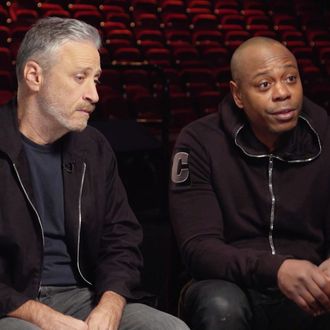
To promote their comedy tour, Jon Stewart and Dave Chappelle recently sat down for a lengthy interview with CNN’s Christiane Amanpour that covers a little bit of everything, from whether or not Trump is good for comedy (Chappelle: “He’s getting too much credit. He’s not making the wave, he’s surfing it”) to how Stewart thinks the mainstream media puts too much emphasis on Twitter “as a reliable arbiter of the emotional state of an issue.” The two also shared their thoughts on the current political divide in the U.S., Louis C.K.’s recent comeback, and what Stewart learned about sexism during his Daily Show days. Below are some of the best quotes from the interview.
Chappelle on if we’re more divided now than before:
Even when they say that Russia influenced the election, it’s kind of like, “Is Russia making us racist? Is that who’s doing it? Okay, thank goodness, I thought it was us.”
Chappelle on why he doesn’t get “stuck in the political divide”:
Because most of the political discussion is so binary, and I’m way more interesting than that. Most people are, if you talk to them. I hear people say “Families are not speaking to one another because of politics” — that sounds insane to me. There are tons of people I love and respect that I completely disagree with.
Chappelle on his 2016 SNL monologue saying he’d give Trump a chance:
I think I said the right thing at the right time, you know what I mean? I think that we had to kind of recalibrate and kind of put things in perspective. I’m a black American, so these feelings that people felt right after the election — we felt that many elections consecutively.
Stewart on Trump’s attacks on journalists:
I think that journalists have taken it personally. They are personally wounded and offended by this man. He baits them, and they dive in. And what he’s done well, I thought, is appeal to their own narcissism, to their own ego … Because the journalists stand up and say, “We are noble! How dare you sir!” And they take it personally, and now, he’s changed the conversation to not that his policies are silly or not working or any of those other things — it’s all about the fight. He’s able to tune out everything else and get people just focused on the fight. He’s gonna win that fight.
Stewart on sexism in comedy:
It started out as a male-dominated field. It’s not a particularly welcoming field — you sort of have to come out there and cut your teeth on it. I’ll tell you a story: So we had, on The Daily Show, there was an article about us [that] said it was a sexist environment, we didn’t have women writers. And I got very offended by that. I was very mad. I was like, “Are you saying I’m not a feminist?” I was raised by a single mother. She wore a T-shirt that said “A woman needs a man like a fish needs a bicycle.” And me and my brother were like, “I think we might be men?” So I was mad — how can they say such a thing? And I went back to the writers room, and I was like, “You believe this, Steve? What do you think, Greg? Dave? Tom? Mike?” And then I was like, Oooohhh. And it was right.
But the reason it was right was not necessarily one that we had seen before. We had put in a system of getting writers where there were no names on it. We thought that’s color-blind, gender-blind, et cetera. But what you don’t realize is the system itself — the tributaries that feed us those submissions — is polluted itself, so all we’re getting are white males who’ve been to Ivy League colleges and wrote for the Lampoon or funny Jewish guys from Brown. So what you had to say, then, is “Send me not that. Send me your women, send me people of color.” And then we’d get the submissions and go “I can’t believe how funny women have gotten just recently.” [Laughs.] But do you see what I mean? It’s a systemic issue, and I think what can mostly help change is when you open up new tributaries to bring in talent, and then they grow, and then they help grow their communities and tell their stories.
Stewart on the debate around Louis C.K. returning to comedy clubs:
I think the question itself is somewhat unanswerable — when you talk about the “right way” in society to rehabilitate. It’s something we’ve struggled with in the criminal justice system forever … There is no recipe; there is no model that can be put together and say, “If he did one, two, and three, everybody would be cool.” I don’t think it works that way. This is something that we find together as a society, but I don’t know that you can say there’s a formula here that makes sense. I’m a believer in restorative justice and the idea that when transgressions occur, the parties must participate together to bring themselves to some conclusion. But the truth is, you won’t find 100 percent. You can’t say, “What’s the right way to do this so that everybody will be okay?” because they won’t.
Watch the full interview right here:


